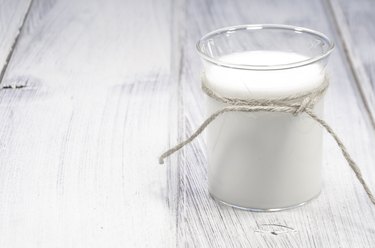
Every nutrient you consume must go through the gastrointestinal tract to be digested and absorbed. Many vitamins and minerals you must consume daily have similar cellular transports and thus compete for absorption. Understanding which minerals in milk compete with magnesium is important because it will help ensure you get maximum absorption of your magnesium supplement.
About Magnesium
Video of the Day
Magnesium is a major mineral responsible for a variety of processes in the body, including synthesis of DNA, replication of DNA and RNA, muscle contractibility, aiding in protein synthesis and aiding over 300 enzymes in various metabolic processes. All of these processes are essential for life, and a deficiency in magnesium could alter many aspects of daily life.
Video of the Day
Daily Requirement and Food Sources
Men between 19 and 30 should consume approximately 400 mg per day, and women of the same age should consume 310 mg of magnesium per day. Men older than 31 need 420 mg per day, and women need 320 mg per day of magnesium. Foods rich in magnesium include coffee, tea, nuts, legumes, whole-grain cereals, dairy products, dark green vegetables and some tofu.
Magnesium and Milk
Although magnesium is found within milk, it may not be in your best interest to consume a magnesium supplement with a glass of milk. Magnesium and calcium have a complicated relationship. Both minerals have overlapping transport systems within the body, so when consumed together they compete for absorption. Magnesium also interacts with calcium at the muscle level and may interfere with muscle contractions as well.
When To Consume Magnesium
Consume your magnesium supplement at a time when you are not going to consume milk or a calcium supplement. Magnesium also interferes with phosphorus and potassium, so consume your supplement when you are not consuming large dosages of these minerals as well. Food sources of phosphorus include meat, poultry, nuts, milk and legumes. Food sources of potassium include avocados, bananas, oranges, potatoes, dairy products and eggs.